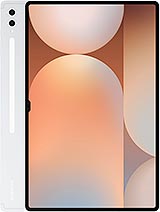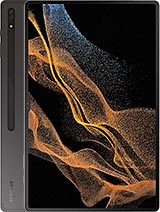

Samsung Galaxy Tab S10 Ultra Screen Size Dimensions
Samsung Galaxy Tab S10 Ultra screen size dimensions, viewport size, pixel density and more information.
Specs:
| WIDTH | 1848 px |
|---|---|
| HEIGHT | 2960 px |
| SCREEN SIZE INCH | 14.6" |
| PX DENSITY | ~239 ppi |
| ASPECT RATIO | 5/8 |
| DISPLAY TYPE | Dynamic AMOLED 2X, 120Hz, HDR10+ |
| PHYSICAL SIZE MM | 326.4 x 208.6 x 5.4 mm |
| OPERATING SYSTEM | Android 14, One UI 6.1 |
| RELEASE DATE | Released 2024, October 03 |
Information:
The Samsung Galaxy Tab S10 Ultra tablet
Tablet screen sizes and displays vary greatly depending on the device. The Samsung Galaxy Tab S10 Ultra has a diagonal size of 14.6" (inches). Most tablet screens are between 7” and 12”, with higher end models reaching up to 15”. These sizes offer a balance between portability and usability. Tablet displays are usually of the LCD type, although OLED is slowly becoming more common. The Samsung Galaxy Tab S10 Ultra has a Dynamic AMOLED 2X, 120Hz, HDR10+ display with a pixel density of ~239 ppi. LCD stands for liquid crystal display, which utilizes two sheets of polarizing material with a liquid crystal solution between them to block or pass light. OLED stands for organic light emitting diode and uses an organic compound that emits light when electricity passes through it to create pixels. This provides superior contrast and brightness compared to LCDs due to their self-emitting nature. The Samsung Galaxy Tab S10 Ultra has a 1848 x 2960 pixels screen size dimension.
Aspect ratio is a measure of the width of the display compared to its height. Most tablets have an aspect ratio of 4:3, 16:9, or 18:9. The Samsung Galaxy Tab S10 Ultra has an aspect ratio of 5/8. 4:3 offers a traditional square shape like computers used before widescreen monitors became popular, 16:9 gives you a wider field of view for better viewing experiences such as watching movies or playing games, and 18:9 takes things even further in terms of width while maintaining solid image quality.
In addition to these factors, there are other specs that affect the display performance such as resolution, pixel density, color depth (bits per pixel), brightness levels (measured in Nits), refresh rate (measured in Hz), response time (measured in ms), and viewing angle (measured in degrees). Resolution refers to how many pixels you can fit into the display area. The display of the Samsung Galaxy Tab S10 Ultra has a total of 4808 pixels. Higher resolutions provide sharper images but require more performance from the device itself. Pixel density is a measurement of how many pixels are crammed into one inch. The Samsung Galaxy Tab S10 Ultra has a pixel density of ~239 ppi. Higher densities allow for sharper images but also require more power from the device itself. Color depth refers to how many colors can be shown on screen at once. Again, higher depths require more power from your device but give you better color accuracy and vibrancy as well as smoother transitions between shades without banding effects. Brightness levels refer to how much light is emitted by your display panel and with a Dynamic AMOLED 2X, 120Hz, HDR10+ display is not a problem. This affects usability in bright conditions as well as battery life if your tablet has an adaptive brightness feature that dims automatically when possible. Refresh rate measures how often your screen refreshes its image per second and affects smoothness when gaming or watching video content. Choosing the right screen size of a tablet might be a difficult choice, that’s why we are here do give you a preview of what to expect from the Samsung Galaxy Tab S10 Ultra. High refresh rates provide smoother motion with less ghosting artifacts while lower rates cause juddering effects at times even on low framerates.
The screen size is not the only thing you need to watch out when buying a tablet but also the physical size and the Samsung Galaxy Tab S10 Ultra has a 326.4 x 208.6 x 5.4 mm or physical size. The physical size should give you an idea of how big the Samsung Galaxy Tab S10 Ultra tablet is and if it is the right for you.
Response time indicates how quickly pixels can change state after receiving new information. Lower times provide better responsiveness during games instead of “ghosting” effects where old frames linger while new ones should already be displayed on screen, creating blurry visuals with slow moving objects due to slow pixel responses. Meanwhile the latest operating system that Samsung Galaxy Tab S10 Ultra uses is Android 14, One UI 6.1.
Finally, viewing angle describes how much off center one can view what’s happening on screen before colors start fading away and details become hard to make out. Higher angles allow everyone around the table or couch to enjoy the same experience without having to huddle up close together if someone wants to watch something farther away from them than others do.
More Tablets from Samsung
 Samsung Galaxy Tab S8 Ultra
Samsung Galaxy Tab S8 Ultra
1848 x 2960 px
 Samsung Galaxy Tab S 10.5
Samsung Galaxy Tab S 10.5
2560 x 1600 px
 Samsung Galaxy Tab S 10.5 LTE
Samsung Galaxy Tab S 10.5 LTE
2560 x 1600 px
 Samsung Galaxy Tab A7 Lite
Samsung Galaxy Tab A7 Lite
800 x 1340 px
 Samsung Galaxy Tab A 8.4 (2020)
Samsung Galaxy Tab A 8.4 (2020)
1200 x 1920 px
 Samsung Galaxy Tab 2 10.1 P5100
Samsung Galaxy Tab 2 10.1 P5100
800 x 1280 px
 Samsung Galaxy Tab S2 9.7
Samsung Galaxy Tab S2 9.7
1536 x 2048 px
 Samsung Galaxy Tab 10.1 P7510
Samsung Galaxy Tab 10.1 P7510
800 x 1280 px








